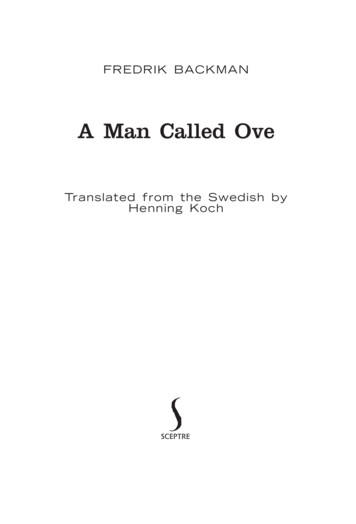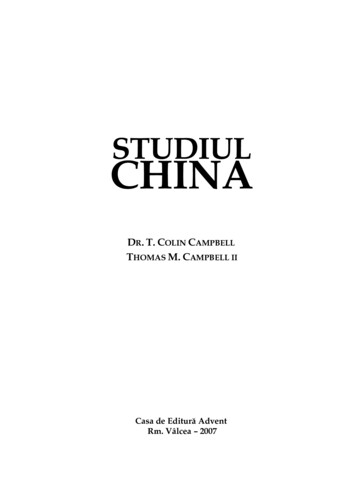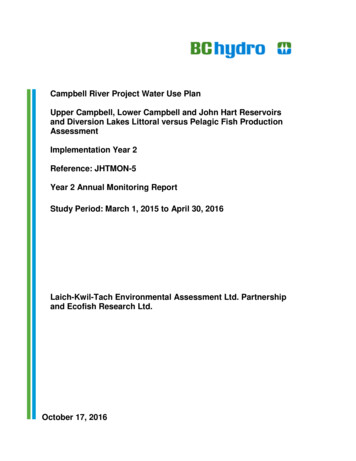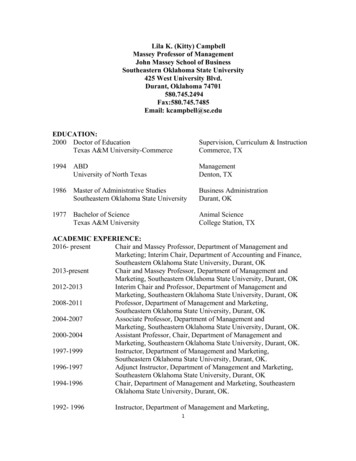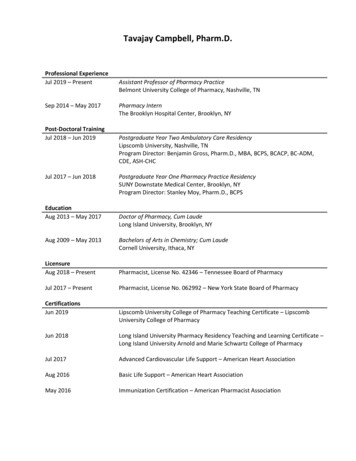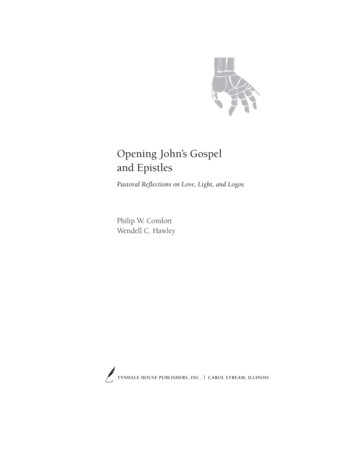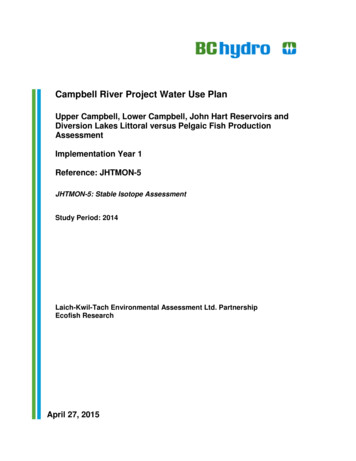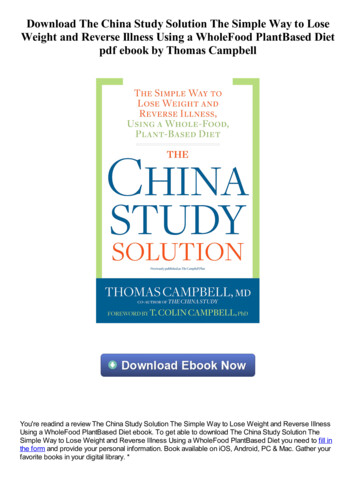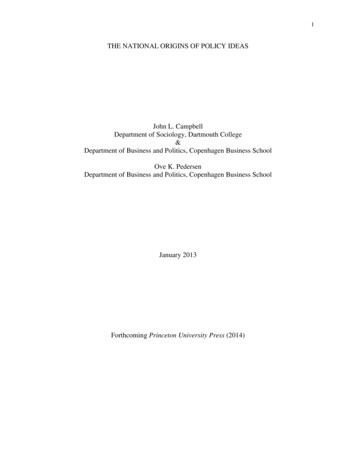
Transcription
1THE NATIONAL ORIGINS OF POLICY IDEASJohn L. CampbellDepartment of Sociology, Dartmouth College&Department of Business and Politics, Copenhagen Business SchoolOve K. PedersenDepartment of Business and Politics, Copenhagen Business SchoolJanuary 2013Forthcoming Princeton University Press (2014)
2Table of ContentsPrefaceList of AcronymsList of Tables and FiguresChapter 1: Knowledge Regimes and the National Origins of Policy IdeasPart I: The Political Economy of Knowledge RegimesChapter 2: The Paradox of Partisanship in the United StatesChapter 3: The Decline of Dirigisme in FranceChapter 4: Coordination and Compromise in GermanyChapter 5: The Nature of Negotiation in DenmarkReprise: Initial Reflections on the National CasesPart II: Issues of Similarity and ImpactChapter 6: Limits of ConvergenceChapter 7: Questions of InfluencePart III: ConclusionChapter 8: Summing Up and Normative ImplicationsPostscript: An Agenda for Future ResearchAppendix: Research Design and MethodsReferences
3PREFACEAlthough we did not realize it at the time, this project began when we decided during aquiet stroll along the Danish sea coast in 2004 to write a short paper about the role of ideas inpublic policymaking. Since then it has taken us to eleven cities in four countries. During ourtravels we had the pleasure of talking with many fascinating people and dining in manywonderful restaurants and cafes. We met some of the smartest people in politics as well as a fewof the most paranoid. Our interviews with them were so riveting that in one case we lost track oftime and missed our train back to Copenhagen, much to the amusement of those we wereinterviewing at the moment. We survived a restaurant fire and witnessed a street brawl. Wewatched pick pockets plying their trade in the Paris subway. We raced along the Germanautobahn one dark and rainy night at 125 miles per hour while the taxi driver flashed his lightsand cursed cars in front of us for not going faster! We saw a couple of dozen enormous tractorsblock traffic outside Christian Democratic Union headquarters in Berlin as farmers protestedCDU agricultural policies. We passed through countless security check points in WashingtonD.C. and sat at the conference table used by Jean Monnet when he planned for the EuropeanCoal and Steel Community after the Second World War. We visited the White House. We sawthe parade grounds in Nuremberg where Hitler addressed mass rallies during the heydays of theThird Reich and where the Allies later held the Nazi top brass for trial and eventual execution.And along the way we collected and processed 15,000 or more pages of interview transcripts anddocuments. In the end we tried to write a book that will be of interest to a wide range of readersin the social sciences and beyond who are curious about how ideas are produced anddisseminated to policymakers and used to affect public policy.Many people helped us along the way. They include Magnus Paulsen Hansen, AntjeVetterlin, Magali Gravier and Vivien Schmidt who helped arrange interviews for us as did theGerman and French embassies in Copenhagen and the Danish embassy in Berlin. CharlesQuincy, Jordan Osserman, Jaclyn Wypler, Andreas Birkbak, Noah Glick and John Mei helped togather, code and organize data from websites, interviews and organization documents. MikeMassagli, Gretchen Wright, Peter Marsden, Kathryn Lively and Kathleen Sherrieb offered sageadvice about developing coding schemes. Anne Ivey, Stephanie Morgan and Deborah Edwardswere an enormous help when it came to managing the project’s funding.We owe special thanks to everyone who agreed be interviewed for this project andespecially those who agreed to read and give us feedback on the chapters for which weinterviewed them once they had been written. Because some of them preferred not to beidentified, we refrain from reporting their names here. Nevertheless, this project would not havebeen possible without their generosity and help for which we are extremely grateful.We thank as well a number of people who commented on various aspects of this projectalong the way or provided comments on drafts of chapters and in some cases the entiremanuscript. These include Denise Anthony, Edward Ashbee, Mark Blyth, Susana Borrás,Robert Boyer, David Brady, Marc Dixon, Marie-Laure Djelic, Marion Fourcade, Patrick LeGalès, Peter Hall, Kathryn Lively, Bruno Palier, Martin Møller Boje Rasmussen, Andrew Rich,Ann Sa’adah, Vivien Schmidt, Len Seabrooke, Kathleen Sherrieb, Kathleen Thelen, Diane
4Stone, Ruy Teixeira and Wolfgang Streeck. Special thanks go to three reviewers from PrincetonUniversity Press—John A. Hall, Nick Ziegler and Elizabeth Popp Berman who providedextensive and extremely helpful comments on an early version of the full manuscript. And, ofcourse, we would be remiss not to thank Eric Schwartz, our editor, who helped guide the projectto its completion. We benefitted as well from presenting portions of the analysis in seminars atthe Social Science Research Council in New York City, Dartmouth College, Boston University,Duke University, Harvard University, the Massachusetts Institute of Technology, CEPREMAP,Alborg University, Krakow University, Tokyo University, Columbia University, BrownUniversity, McGill University, University College-Dublin, Sciences Po, Koç University, theUniversity of Sydney and the Copenhagen Business School. We benefitted tremendously from amanuscript review seminar sponsored by the John Sloan Dickey Center for InternationalUnderstanding at Dartmouth, for which we owe special thanks to Ken Yalowitz and ChristianneHardy Wohlforth.Financial support was provided by the U.S. National Science Foundation (SES-0813633),the Copenhagen Business School through its World Class Project funds, the Nelson A.Rockefeller Center at Dartmouth College, and the Department of Business and Politics (formerlythe International Center for Business and Politics) at the Copenhagen Business School. In asimilar vein, special thanks go to Finn Jung Jensen, former president of the CopenhagenBusiness School, and Alan Irwin, Dean of Research at the Copenhagen Business School.Finally, we must thank our wives, Kathy Sherrieb and Anne Bøttger Pedersen. Theyprovided more moral support to us than we probably deserved throughout this project. For theseand many other reasons we dedicate this book to them with much love and affection.John L. CampbellLyme, New HampshireOve K. PedersenCopenhagen, Denmark
5CHAPTER 1KNOWLEDGE REGIMES AND THE NATIONAL ORIGINS OF POLICY IDEASTwo conservative Congressional staff members in Washington D.C., Ed Feulner and PaulWeyrich, were frustrated in 1971 by the lack of timely policy-relevant research on Capitol Hill.Their frustration peaked when an impressive and potentially influential briefing paper about thesupersonic transport prepared by a prominent conservative think tank arrived a day afterCongress voted on the issue—too late to influence the vote. Frustration led to action. In 1973with the help of wealthy benefactors like the beer tycoon Joseph Coors they established theHeritage Foundation, an aggressive policy research organization dedicated to quickly producingand disseminating conservative policy analysis to members of Congress so that conservativeideas would have greater influence on policymaking. It worked. Notably, in 1980 the HeritageFoundation provided Edwin Meese, the head of Ronald Reagan’s transition team, a hefty volumecalled Mandate for Leadership, a conservative blueprint for transforming all aspects of publicpolicy and intended as a guide for the incoming administration. It was a best seller inWashington for weeks and reputedly guided the administration’s initial budget cutting efforts ata time when conservatives believed that excessive government spending was causing inflationand economic malaise in America. The Heritage Foundation’s reputation soared and marked thebeginning of a seismic change in how policy research organizations operated in Washington.1Since then and thanks to challenges associated with the rise of globalization and thetransformation of advanced capitalism policy research organizations in the United States andEurope have undergone major changes as people have tried to use policy analysis and other ideasto more effectively influence policymaking and solve national economic problems. But theyhave done so in nationally specific ways. This book explains these changes as they unfolded inthe United States, France, Germany and Denmark. In doing so it answers several pressing yetmuch neglected questions: Where do the ideas come from over which policymakers fight andthat affect policymaking and public debates? How has this changed with the onset ofglobalization? And, most important, how has all of this varied across different types of advancedcapitalist countries? In short, this book is about the national origins of policy ideas.Researchers in the social sciences have long debated whether policy analysis, economictheories and other sorts of ideas as well as self-interests affect policymaking in advancedcapitalist countries. Many now agree that ideas matter a lot. Peter Hall, for instance, showedthat big intellectual policy paradigms like Keynesianism and then neoliberalism shapedeconomic policy after the Second World War. Mark Blyth revealed how policy makers usedideas as weapons in their political struggles to reform taxation and government spending. FrankDobbin argued that deep-seated values regarding the appropriate relationship between the stateand economy influenced the development of national transportation policies. And others,particularly Vivien Schmidt, explained that cognitive and discursive structures helped framepolicy debates in different ways in different countries.21Rich 2004, pp. 53-55; Smith 1991, pp. 194-202; Weidenbaum 2009, p. 96.Blyth 2002; Dobbin 1992; Hall 1989a, 1993; Schmidt 2002, 2001. The literature on how ideas matter is extensive.Other examples include Babb (2001), Béland and Cox (2011), Berman (1998, 2006), Campbell (2002, 1998),Goldstein and Keohane (1993), Katzenstein (1996), McNamara (1998) and Rueschemeyer and Skocpol (1996).2
6We accept that ideas matter for politics. Our concern, however, is that those who haveshown that ideas are important have paid remarkably little attention to how these ideas areproduced and disseminated in the first place and how this varies across countries and over time.So this book is not about how ideas matter or why policymakers choose one idea over another. Itis about the organizational and institutional machinery by which these ideas are produced indifferent ways in different countries. This is especially important because variation in thismachinery helps explain how policy ideas themselves differ across time and place. To ourknowledge this is the first study of its kind.The book focuses on how policy research organizations like think tanks, governmentresearch units, political party foundations and others that produce and disseminate policy ideasare organized, operate and have changed during the last thirty years or so in our four advancedcapitalist countries. In each country these organizations constitute what sociologists call anorganizational field—a community of organizations whose participants engage in similaractivities and interact more frequently with one another than with organizations outside thefield.3 We call fields of policy research organizations and the institutions that govern themknowledge regimes. Knowledge regimes are the organizational and institutional machinery thatgenerates data, research, policy recommendations and other ideas that influence public debateand policymaking.Policymakers need the information produced by knowledge regimes insofar as the policyproblems they confront often involve ambiguity and uncertainty. They need it to make sense ofthese problems. Sense making is often a contested process involving varying degrees ofcompetition, negotiation and compromise—often involving power struggles—over theinterpretation of problems and solutions for them. A knowledge regime, then, is a sense-makingapparatus.4 Just as sense making occurs in different ways in organizations depending on howthey are organized individually, it also occurs in different ways in knowledge regimes dependingon how they are organized as a field. Sense making is especially important and difficult forpolicymaking during periods of crisis when ambiguity and uncertainty are extreme becauseproblems are unfamiliar and conventional policy prescriptions no longer work. During periodsof crisis sense making can take a long time and may involve changing the sense-makingapparatus itself.5 This is just what happened in nationally specific ways in our four knowledgeregimes beginning in the late 1970s and early 1980s.ANALYTIC ARGUMENTSOur overarching argument is that policy ideas have national origins and the way they are3DiMaggio and Powell 1983; Dobbin 1992, 1994; Fligstein 1990; Fligstein and McAdam 2012; Schneiberg 1999,2002, 2007; Schneiberg and Bartley 2001; Scott 2001.4The term sense making is from organizational theory and is generally described as a process involving a set oforganizations and institutions that help people interpret the problems they face and determine how to tackle them(e.g., March 2010; Weick 1995). Political economists also recognize that policymakers face uncertainty andambiguity and thus need to interpret—that is, make sense of—their situations and do so often in ways that facilitatechange (Blyth 2011; Mahoney and Thelen 2010a; Orren and Skowronek 1994; Streeck and Thelen 2005, chap. 1).5For examples of lengthy sense-making episodes during times of economic crisis, see, for example, Blyth (2002)and Hay (2001).
7produced is largely determined by nationally specific institutions. In substantiating this claim,however, we offer four additional analytic arguments. The first three provide new insights intoprevious research on globalization and the rise of neoliberal ideas; comparative politicaleconomy; and organizational convergence. As we are about to explain, we identify and begin tofill important gaps in these three overlapping research literatures and challenge some of their keyclaims. The fourth analytic argument constitutes our causal model of the national construction ofknowledge regimes. Our interest in these things stems from our long-standing curiosity aboutinstitutions and institutional change.6The End of the Golden Age and the Rise of Globalization and NeoliberalismSense making and knowledge regimes became especially important in advanced capitalistcountries during the era of economic globalization whose onset was marked by the end of theGolden Age of post-war capitalism—a period of strong economic growth, welfare statedevelopment and general prosperity enjoyed by many advanced capitalist countries during thefirst three decades after the Second World War.7 The end of the Golden Age was accompaniedby the onset of a stagflation crisis where economic stagnation and inflation increasedsimultaneously during the 1970s and 1980s. We will have more to say about this later in thechapter. But for now what is important is that stagflation discredited conventional Keynesianpolicy ideas in many advanced capitalist countries and triggered what some have called a “war ofideas” in North America and Europe in which political opponents used theories, data, ideologyand rhetoric as weapons in the fight over economic policy.8 These ideas varied widely from leftto right across the political spectrum and across countries and were all attempts to make sense ofthis unprecedented situation.9 Among them neoliberalism—the call for less public spending,lower taxes, especially on business and the wealthy, and less state intervention into theeconomy—figured prominently. And once ideas like these were adopted they had far-reachingconsequences for how successfully economies performed.Much attention has been paid to globalization and the end of the Golden Age and how ittransformed the advanced capitalist countries after the 1970s thanks to pressures associated withincreased international capital mobility, new telecommunications technologies, the emergence offree-trade zones like the European Union, and more. New forms of economic organizationresulted, such as the emergence of global outsourcing, international commodity chains andnetwork-like corporate structures.10 New economic and social policies appeared too includingsometimes the scaling back of welfare states and tax burdens.11 What is missing in thisliterature, however, is attention to the rise of knowledge regimes as a means of searching for new6See, for example, Campbell (2004), Campbell and Pedersen (2001) and Pedersen (2010, 2011).Marglin and Schor 1990. Others have described the Golden Age as a period of “embedded liberalism” (Ruggie1982) and advanced “Fordism” (Piore and Sabel 1984). This is not to say that the advanced capitalist countries werewithout problems during the Golden Age or that their experiences were all the same. There was much variation. Inparticular, two of our European countries, Germany and France, had to rebuild after the devastation of the SecondWorld War whereas Denmark and the United States did not.8Blyth 2002, pp. 258-59; Fourcade-Gourinchas and Babb 2002; Stiglitz 2009, p. 211; Weidenbaum 2009, p. 29.9These ideas were derived from a wide variety of perspectives including neo-Marxism, institutional economics,industrial policy, post-Keynesianism, neoliberalism, public choice theory and monetarism among others (Blyth2002; Fourcade 2009; Fourcade-Gourinchas and Babb 2002; Mudge 2008; Prasad 2006).10DiMaggio 2001; Gereffi 2005.11Steinmo 1993; Swank 2002.7
8ideas about how to make sense of and cope with globalization and its challenges. For instance,David Held and colleagues’ well-known Global Transformations offered an impressive analysisof how globalization caused a variety of political, economic and cultural changes around theworld. But they provided little discussion—or even recognition—of where the ideas came fromwith which people tried to make sense of these changes.12Following Max Weber, who argued that ideas are an important starting point for thedevelopment of capitalism, we argue that knowledge regimes became more important foradvanced capitalist countries as policymakers and others grappled with the challenges ofglobalization.13 Put differently, this is an age where policymakers strive to recognize andimprove their country’s institutional competitive strengths and rely increasingly on theproduction of policy relevant knowledge to do so.14 This is why overlooking the significanceand transformation of knowledge regimes is a serious omission in the research on globalizationand the end of the Golden Age. By correcting this we illuminate a previously unexploreddimension of the breakdown in consensus on economic management that followed the end of theBretton Woods system in the 1970s and the demise of the Golden Age.But the manner in which knowledge regimes help policymakers make sense of and dealwith the challenges of globalization varies across countries. This is important for understandingthe international diffusion of neoliberalism. Several scholars have argued that neoliberal ideasdiffused internationally since the end of the Golden Age as globalization began to occur. Inparticular, researchers have claimed that this resulted in tendencies toward internationalconvergence on a common set of political and economic outcomes, such as certain forms ofmarket reregulation and welfare retrenchment.15 As Frank Dobbin and his colleagues remarkedwith reference to the globalization literature, “The power of global models is increasingly takenfor granted even in studies focusing on domestic economic and political conditions.”16 We offertwo arguments in this regard. First, we challenge albeit cautiously that neoliberalism is as takenfor granted today as many believe. We show that the adoption of neoliberalism at least bynational councils of economic advisors was highly uneven across our four countries and in onecase was largely rejected. Second, although some researchers have also noted this sort ofunevenness they attributed it to the fact that neoliberal ideas were translated (or not) into localpractice by way of political and economic institutions already in place. In other words, nationalpolitical-economic factors mediated the degree to which neoliberalism was adopted from onecountry to the next. We argue, however, that the structure and practices of knowledge regimes—not just political and economic institutions—also had important mediating effects. This isbecause knowledge regimes are where neoliberal ideas were often formulated and debated, andbecause the nationally specific organization of knowledge regimes affected how these and otherideas were crafted in the first place. This leads to our second argument—one that bears directlyon literature in comparative political economy and the issue of national diversity.12Held et al. 1999.Weber 1958.14Pedersen (2010), for instance, shows that the academic discussion of national institutions and institutionalcompetitiveness seeped into policymaking discourse and guided policy reform since the 1970s.15Lane 2005; Simmons et al. 2008; Thatcher 2005.16Dobbin et al. 2007, p. 450. See, for example, Crouch (2011), Fourcade-Gourinchas and Babb (2002), Harvey(2005) and Simmons et al. (2008) on the diffusion of neoliberalism.13
9Comparative Political EconomyKnowledge regimes are just as important for modern political economies aspolicymaking and production regimes at least insofar as knowledge regimes produce the ideasthat inform what political and economic elites do. However, policymaking and productionregimes have received the lion’s share of attention from comparative political economists. Muchof their work dwells on how policymaking and production regimes respond to globalization innationally specific ways. This work emerged in two waves. The first was about policymakingregimes, which were scrutinized closely in the 1980s and 1990s by social scientists like PeterEvans, Dietrich Rueschemeyer and Theda Skocpol whose volume Bringing the State Back In setthe tone for much of this research.17 Policymaking regimes involve the organization andgovernance of states, political parties and other political institutions. They vary across countriesin many ways. For instance, policymaking is more centralized bureaucratically in somepolicymaking regimes than others. Elections are based on winner-take-all rules in somepolicymaking regimes but proportional representation in others. In turn, some policymakingregimes feature considerably more political parties and tend more toward compromise thanothers. And some policymaking regimes rely more heavily on the career civil service thanothers. Research shows that all of these factors influence how policy is made and contributes todifferent national styles of policymaking.18The second wave in comparative political economy involved the analysis of productionregimes. It emerged in the late 1990s and early 2000s thanks largely to the emergence of the socalled Varieties of Capitalism School, pioneered by Peter Hall and David Soskice, who wantedto bring the analysis of firms back into comparative political economy. Their edited collectionVarieties of Capitalism: The Institutional Foundations of Comparative Advantage remains theclassic statement of this perspective. They assert that the important roles of firms and othereconomic actors were overshadowed for years in comparative political economy by studies ofpolicymaking regimes. Production regimes involve the organization of economic activitythrough markets and other market-related institutions, which govern the inter-relationshipsamong firms, customers, employers, employees and owners of capital. Some production regimesare dominated by large firms while others are dominated by small and medium sized firms.Some firms are owned by families, others by diverse shareholders, and still others in part by thestate. Some firms depend on equity and bond markets for finance while others depend on banksor the state. Some production regimes have strong unions, employer associations and corporatistbargaining while others do not.19 Researchers demonstrated that all of these factors influencedhow well national economies adjusted to economic challenges, problems and crises.One of the most important contributions of the Varieties of Capitalism School was toshow that different institutional combinations sometimes create synergies that help improveoverall economic performance in ways that would not happen otherwise. Such synergy istypically called institutional complementarity. Generous universal welfare state provisions, for17Evans et al. 1985.For further important statements of bringing the state back into policy analysis, see, for example, Hicks andKenworthy (1998), Katzenstein (1978), Schmidt (2002) and Steinmo et al. (1992). In a related vein, some scholarscompared national styles of policymaking (e.g., Richardson 1982; Vogel 1986).19Hall and Soskice 2001a; Hancké et al. 2007a; Soskice 1999.18
10instance, may enhance labor market flexibility such that the political institution helps improvethe performance of the economic institution. Not all institutional combinations do this.20 RobertBoyer is one of the few to argue that complementarities sometimes breakdown as circumstanceschange and institutional combinations become dysfunctional. Nor in his view are institutionalcomplementarities necessarily self-evident; sometimes they must be discovered much asinvestors spot opportunities for arbitrage—all of which is to say that institutionalcomplementarities are often as much a matter of perception and intentional action as they are ofinstitutional structure per se.21Comparative political economists now often characterize national political economies interms of combinations of different types of policymaking and production regimes and theinstitutional complementarities they entail.22 And their work has provided countless insights intohow advanced political economies operate. But they err in ignoring the important role thatknowledge regimes play in all of this. After all, policymakers use the ideas emanating fromknowledge regimes to formulate and implement the public policies that affect how productionregimes are organized and operate and, in turn, how successful they are.23 In other words,knowledge regimes constitute an additional source of institutional complementarity insofar as theanalysis and advice they generate helps leaders in the policymaking and production regimesmake sense of and resolve problems and thus improve national economic performance. How thishappens depends on the nationally specific ways in which knowledge regimes are organized.It is surprising that such a blind spot for knowledge regimes exists because a richliterature has emerged on how ideas matter for policymaking, and because some prominentrepresentatives of the policymaking and production regime literatures, such as Peter Katzensteinand Peter Hall, respectively, have contributed to it!24 A few researchers have written aboutindependent, non-profit, private think tanks. However, only a few of them discussed theseorganizations in connection with other types of policy research organizations, such as thoseassociated with either the state or political parties, as an entire national field.25 And with theexception of a few edited volumes, their work lacked cross-national comparisons.26 Otherresearchers were more attentive to cross-national differences in how policy ideas were producedbut only with examples from the early part of the twentieth century when national politicaleconomies were vastly different from today. We have in mind here especially DietrichRueschemeyer and Theda Skocpol’s collection entitled States, Social Knowledge, and theOrigins of Modern Social Policies.27 Finally, some studies have shown how the economicsprofession developed and influenced public policy in different countries. They too pay lessattention than we would like to our principal concerns—how policy research organizationsoperate in the first place, and how policymaking and production regimes influence knowledge20Hall and Soskice 2001b; Crouch 2005.Boyer 2005a, 2005b. See also, Campbell (2011), Hall (2005), Höpner (2005, p. 343) and Streeck (2005).22See, for example, Amable (2003), Campbell (2011), Campbell and Pedersen (2007a); Hancké et al. (2007b),Kenworthy (2004, 2006).23Blyth 2002; Campbell and Lindberg 1990; Fligstein 1990; Hall 1989b.24Hall 1992, 1993; Katzenstein 1996. See also Blyth (2002, 1997) and Schmidt (2002, 2001, 2000).25Medvetz 2012; Rich 2004.26See, for example, Desai (1994), Medvetz (2012), Ricci (1993), Rich (2004) and Smith (1989). For comparativeexceptions see Abelson (2002), McGann and Weaver (2000), Stone and Denham (2004) and Stone et al. (1998).27Rueschemeyer and Skocpol 1996. See also Furner and Supple (1990) and Hall (1989a).21
11regimes.28 For instance, Marion Fourcade and Sarah Babb argued that the stagflation periodushered in new ways of thinking about economic policy and showed how economists playedimportant roles in several countries. But they had little to say about the policy researchorganizations many of these experts inhabited or how these organizations went about theirbusiness either individually or collectively. And Fourcade’s excellent book Economists andSocieties, which analyzed the development of the economics profession in France, Britain andthe United States, focused on the relationships between economists and universities butdownplayed the role of economists in policy research organizations, particularly outside thestate.29 In short, although all these literatures are insightful they shed less light than one mighthope on how knowledge regimes are organized, operate a
the International Center for Business and Politics) at the Copenhagen Business School. In a similar vein, special thanks go to Finn Jung Jensen, former president of the Copenhagen Business School, and Alan Irwin, Dean of Research at the Copenhagen Business School. Finally, we must thank our wives, Kathy Sherrieb and Anne Bøttger Pedersen. They


